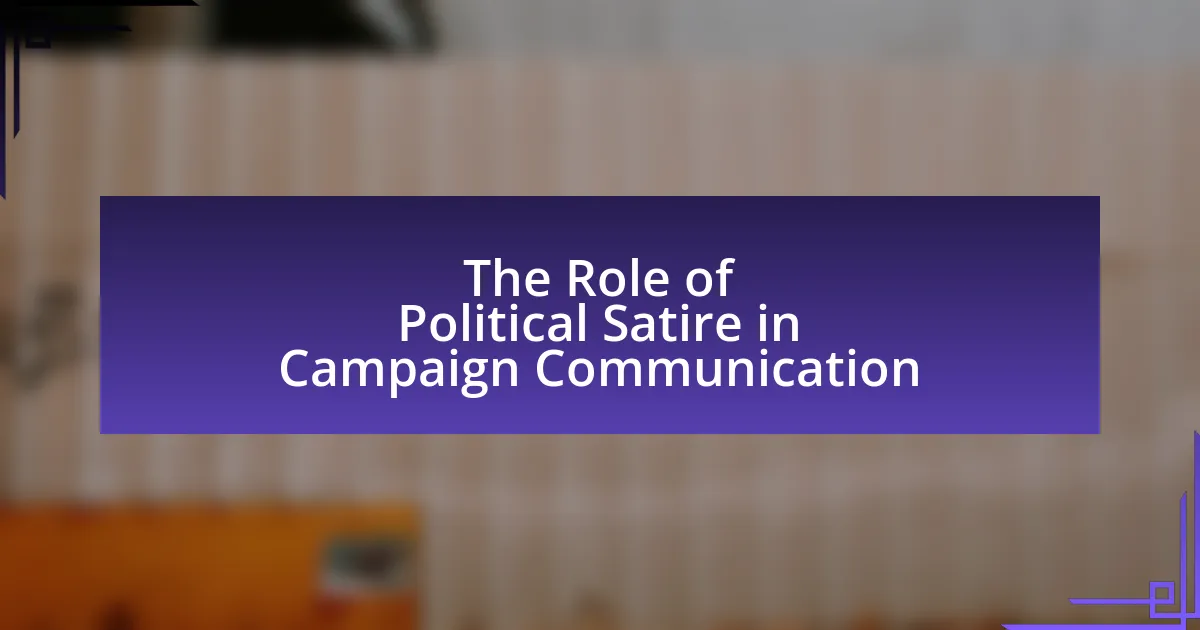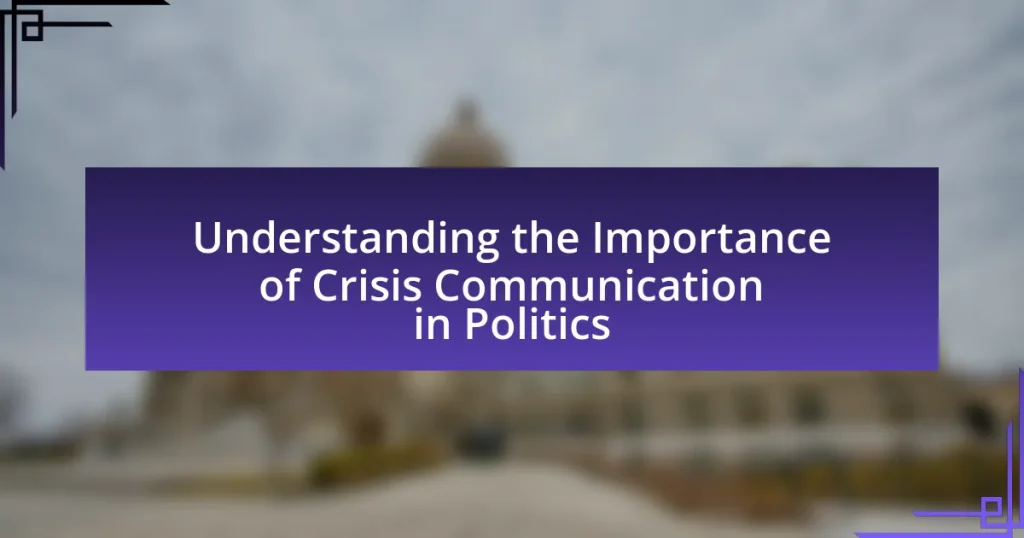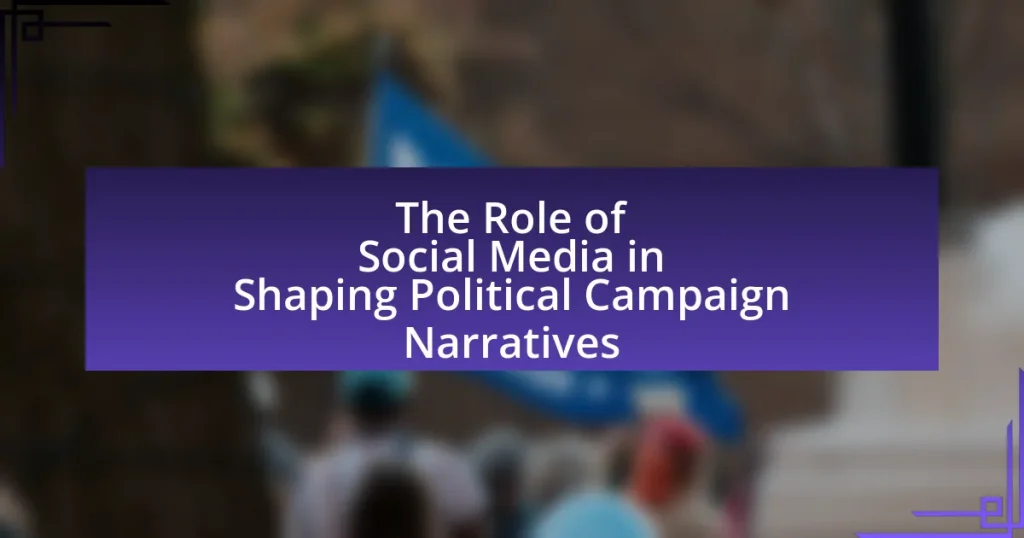Political satire plays a significant role in campaign communication by shaping public perception and influencing voter behavior. It serves as a critique tool, making complex political issues more accessible and engaging, particularly for younger audiences. The article explores how political satire impacts public opinion, voter turnout, and engagement, highlighting techniques such as exaggeration and irony. It also examines the historical context of political satire, its effectiveness in modern discourse, and the role of social media in disseminating satirical content. Additionally, the article discusses best practices for candidates using satire in their campaigns, emphasizing the importance of relatability, clarity, and audience feedback.
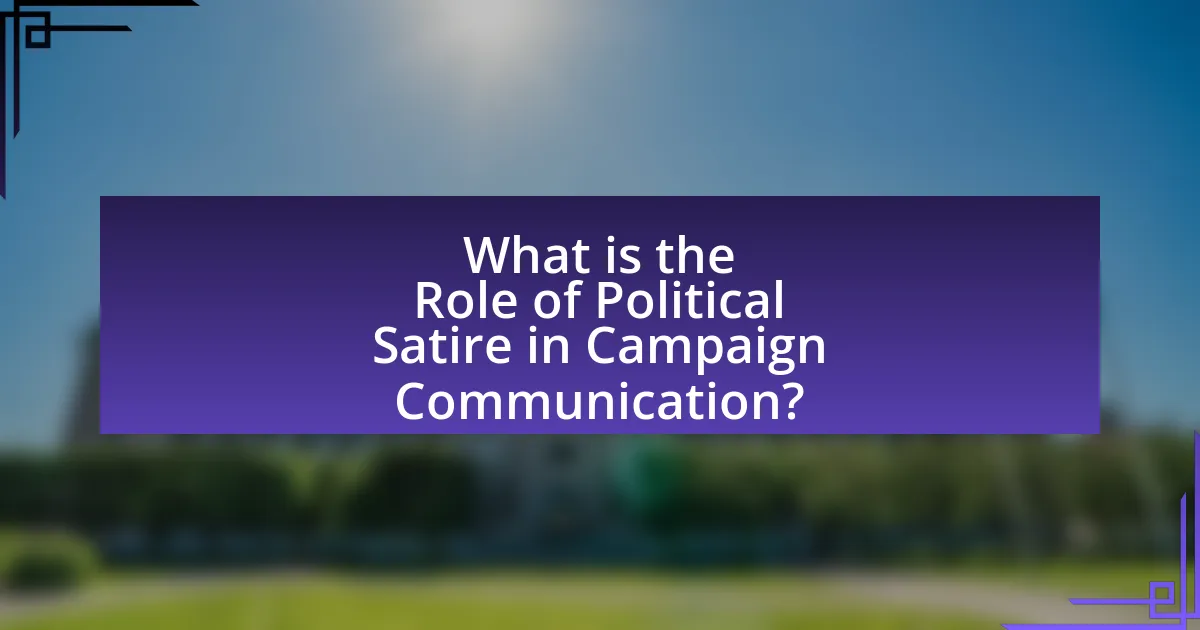
What is the Role of Political Satire in Campaign Communication?
Political satire plays a crucial role in campaign communication by shaping public perception and influencing voter behavior. It serves as a tool for critique, allowing comedians and satirists to highlight the flaws and inconsistencies of political candidates and their policies, often making complex political issues more accessible and engaging to the general public. Research indicates that exposure to political satire can increase political awareness and engagement, as seen in studies showing that viewers of satirical programs like “The Daily Show” are more informed about political issues compared to non-viewers. This engagement can lead to increased voter turnout, as satire often motivates individuals to participate in the political process by making them feel more connected to the issues at stake.
How does political satire influence public perception during campaigns?
Political satire significantly influences public perception during campaigns by shaping opinions and framing political narratives. It often highlights the absurdities and contradictions in candidates’ positions, making complex political issues more accessible and engaging for the public. Research indicates that exposure to political satire can lead to increased political awareness and engagement, as seen in studies like “The Effects of Political Satire on Public Opinion” by Hollander and Karpowitz, which found that viewers of satirical content were more likely to discuss political issues and participate in civic activities. This influence is particularly pronounced among younger audiences, who may rely on satire as a primary source of political information, thus impacting their perceptions of candidates and issues during election cycles.
What techniques are commonly used in political satire?
Political satire commonly employs techniques such as exaggeration, parody, irony, and caricature. Exaggeration amplifies the flaws or absurdities of political figures or policies, making them more noticeable and often humorous. Parody mimics the style or content of political speeches or media, highlighting contradictions or failures. Irony presents a contrast between expectations and reality, often revealing deeper truths about political situations. Caricature visually or verbally distorts characteristics of political figures to emphasize their traits, making them more recognizable and critiqued. These techniques effectively engage audiences and provoke critical thinking about political issues.
How does political satire differ from traditional campaign messaging?
Political satire differs from traditional campaign messaging primarily in its approach and intent. While traditional campaign messaging aims to persuade voters through factual information and positive portrayals of candidates, political satire employs humor, irony, and exaggeration to critique and expose the flaws of political figures and policies. For example, shows like “Saturday Night Live” often use comedic sketches to highlight the absurdities of political events, which can resonate emotionally with audiences and provoke critical thinking. This method can engage viewers in a way that straightforward campaign messages may not, as satire encourages reflection on political realities through entertainment.
Why is political satire significant in modern political discourse?
Political satire is significant in modern political discourse because it serves as a tool for critique and engagement, allowing citizens to question authority and political decisions. By using humor and exaggeration, political satire can simplify complex issues, making them more accessible to the public. For instance, shows like “Saturday Night Live” and “The Daily Show” have historically influenced public opinion and voter behavior, as evidenced by studies showing that viewers of satirical content are more informed about political issues compared to non-viewers. This engagement fosters a more informed electorate, encouraging critical thinking and discussion around political matters.
What historical context has shaped the use of political satire in campaigns?
The historical context that has shaped the use of political satire in campaigns includes the evolution of print media, the rise of mass communication, and significant political events. Political satire emerged prominently in the 18th century with publications like “The Spectator” and “The Tatler,” which critiqued political figures and policies through humor. The advent of radio and television in the 20th century further amplified satire’s reach, allowing figures like Jon Stewart and Stephen Colbert to influence public opinion during critical elections. Events such as the Watergate scandal and the Vietnam War heightened the public’s appetite for satirical commentary, as citizens sought to navigate complex political landscapes. This historical trajectory demonstrates how political satire has been utilized as a tool for critique and engagement in democratic societies.
How does political satire engage younger audiences compared to older forms of communication?
Political satire engages younger audiences more effectively than older forms of communication by utilizing humor and relatable content that resonates with their experiences and values. Younger audiences are more likely to consume content through digital platforms, where political satire often thrives, such as social media and streaming services. For instance, shows like “Saturday Night Live” and online creators on platforms like YouTube and TikTok use satire to address current events in a way that is accessible and entertaining, leading to higher engagement rates among younger viewers. Research indicates that 60% of younger voters prefer humorous political content, as it simplifies complex issues and encourages discussion, making it a powerful tool for political engagement compared to traditional media, which may appear more formal and less relatable.
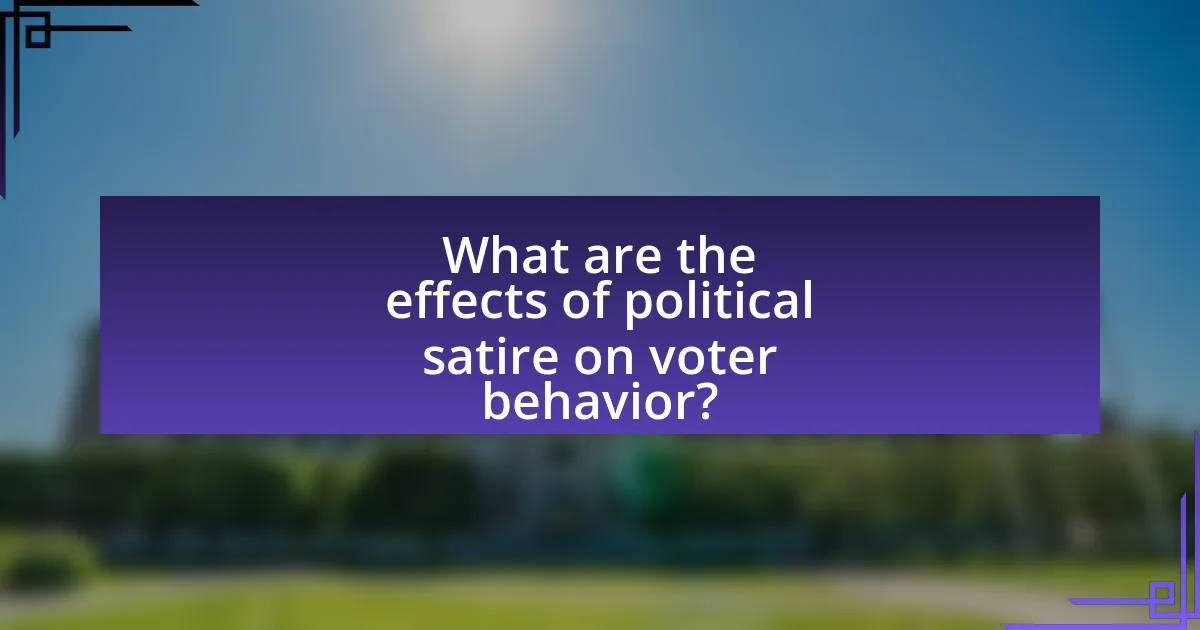
What are the effects of political satire on voter behavior?
Political satire significantly influences voter behavior by shaping perceptions of candidates and political issues. Research indicates that exposure to political satire can increase political engagement, particularly among younger voters, by making complex political topics more accessible and entertaining. For instance, a study published in the journal “Political Communication” by researchers at the University of Pennsylvania found that viewers of satirical programs were more likely to discuss political issues and participate in elections compared to those who did not consume such content. Additionally, political satire often highlights the absurdities and contradictions in political discourse, which can lead to increased skepticism towards politicians and traditional media, ultimately affecting voting decisions.
How does political satire impact voter turnout?
Political satire positively impacts voter turnout by engaging younger audiences and increasing political awareness. Research indicates that exposure to political satire can enhance interest in political issues, leading to higher participation rates in elections. For instance, a study published in the journal “Political Communication” by researchers at the University of Pennsylvania found that individuals who consume political satire are more likely to discuss politics and subsequently vote, with a reported increase in turnout by approximately 10% among regular viewers of satirical programs. This engagement is particularly significant among younger demographics, who may feel disconnected from traditional political discourse.
What evidence supports the claim that satire can mobilize voters?
Research indicates that satire can effectively mobilize voters by increasing political engagement and awareness. A study conducted by the Pew Research Center found that individuals who consume satirical content are more likely to discuss political issues and participate in elections compared to those who do not engage with satire. Additionally, a 2018 study published in the journal “Political Communication” demonstrated that exposure to satirical programs like “The Daily Show” and “Saturday Night Live” significantly increased voter turnout among young audiences, with a reported increase of 14% in voter participation. These findings illustrate that satire not only entertains but also serves as a catalyst for political action, encouraging viewers to become more informed and involved in the electoral process.
How do different demographics respond to political satire?
Different demographics respond to political satire in varied ways, influenced by factors such as age, education, and political affiliation. Research indicates that younger audiences, particularly those aged 18-29, tend to engage more with political satire, finding it relatable and entertaining, which enhances their political awareness. In contrast, older demographics may appreciate satire but often prefer traditional news sources, leading to less engagement with satirical content.
Additionally, individuals with higher education levels are more likely to understand and appreciate the nuances of political satire, while those with lower educational attainment may not fully grasp the intended humor or critique. Political affiliation also plays a significant role; for instance, individuals who identify with a particular political party may respond more positively to satire that aligns with their views, while those with opposing beliefs may perceive the same content as biased or offensive.
These patterns are supported by studies such as “The Effects of Political Satire on Political Engagement” by researchers at the University of Pennsylvania, which found that exposure to political satire can increase political participation among younger, more educated audiences.
What role does social media play in the dissemination of political satire?
Social media serves as a crucial platform for the dissemination of political satire by enabling rapid sharing and engagement among users. This immediacy allows satirical content to reach a wide audience quickly, often going viral and influencing public discourse. For instance, a study by the Pew Research Center found that 55% of social media users encounter political satire, which shapes their perceptions of political issues and candidates. Additionally, platforms like Twitter and Facebook facilitate interactions, allowing users to comment, share, and remix satirical content, further amplifying its reach and impact on political communication.
How has social media changed the landscape of political satire?
Social media has transformed the landscape of political satire by enabling rapid dissemination and engagement with satirical content. Platforms like Twitter, Facebook, and Instagram allow satirists to reach vast audiences instantly, bypassing traditional media gatekeepers. This shift has led to a more participatory culture where users can share, remix, and respond to satire, amplifying its impact. For instance, during the 2016 U.S. presidential election, satirical content on social media significantly influenced public discourse, with studies indicating that memes and satirical videos shaped voter perceptions and engagement. The immediacy and interactivity of social media have thus redefined how political satire is created, consumed, and understood in contemporary society.
What are the risks associated with political satire on social media platforms?
Political satire on social media platforms poses several risks, including the potential for misinformation, polarization, and backlash against creators. Misinformation can arise when satire is misunderstood or taken literally, leading to the spread of false narratives. A study by the Pew Research Center found that 64% of Americans believe that political satire can mislead people about political issues. Additionally, political satire can contribute to polarization by reinforcing existing biases, as individuals may only engage with content that aligns with their views, further entrenching divisions. Finally, creators of political satire may face backlash, including harassment or censorship, particularly if their content is perceived as offensive or controversial.
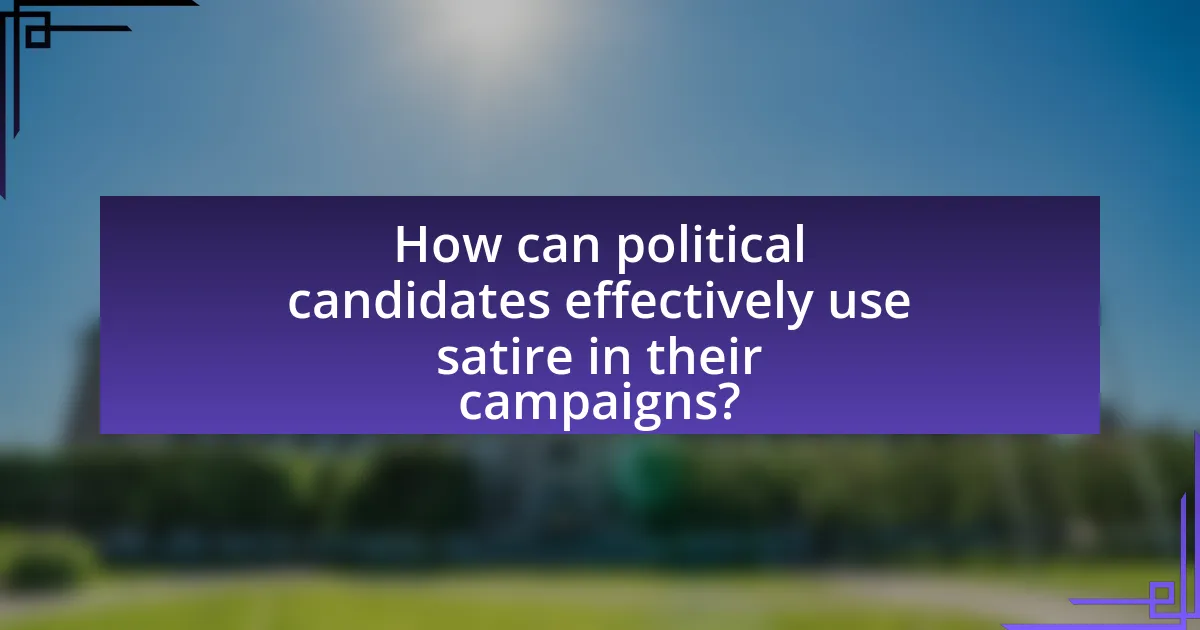
How can political candidates effectively use satire in their campaigns?
Political candidates can effectively use satire in their campaigns by leveraging humor to critique opponents and highlight political issues, thereby engaging voters in a memorable way. Satire allows candidates to address serious topics while making them more accessible and relatable, which can enhance voter connection. For instance, during the 2008 presidential campaign, Barack Obama utilized satirical elements in his speeches and advertisements, which resonated with younger voters and contributed to his appeal. Research indicates that humor in political communication can increase message retention and encourage political participation, as seen in studies published in the Journal of Communication.
What strategies should candidates consider when incorporating satire?
Candidates should consider using clear and relatable humor to effectively incorporate satire. This strategy allows candidates to connect with their audience by addressing relevant political issues in a way that is both engaging and thought-provoking. For instance, using exaggerated scenarios or irony can highlight the absurdities in political situations, making complex topics more accessible. Research indicates that humor can enhance message retention and increase audience engagement, as seen in studies by the Pew Research Center, which found that satirical content often resonates more with younger voters. By strategically employing satire, candidates can foster a memorable and impactful campaign communication strategy.
How can candidates balance humor and seriousness in their messaging?
Candidates can balance humor and seriousness in their messaging by strategically integrating light-hearted elements while maintaining a focus on key issues. This approach allows candidates to engage audiences emotionally, making serious topics more relatable without undermining their importance. For instance, using humor can humanize candidates and create a memorable connection with voters, as seen in campaigns where candidates use witty remarks to address complex policies. Research indicates that humor can enhance message retention and increase audience engagement, as demonstrated in studies like “The Effects of Humor on Political Communication” by Jennifer L. Lawless and Richard L. Fox, which highlights how humor can effectively convey serious messages while fostering a positive perception of candidates.
What pitfalls should candidates avoid when using political satire?
Candidates should avoid alienating potential voters when using political satire. Political satire can be polarizing, and if candidates target specific groups or individuals too aggressively, they risk losing support from undecided voters or those who may not share the same views. For instance, a study by the Pew Research Center found that humor can reinforce existing biases, leading to further division rather than engagement. Additionally, candidates should be cautious about the timing and context of their satire; inappropriate or poorly timed jokes can backfire, damaging their credibility and public image.
What best practices can enhance the effectiveness of political satire in campaigns?
To enhance the effectiveness of political satire in campaigns, creators should focus on relatability, clarity, and timing. Relatable content resonates with audiences, making them more likely to engage; for instance, referencing current events or widely recognized cultural phenomena can increase relatability. Clarity ensures that the satire is easily understood, allowing the audience to grasp the intended message without confusion; using straightforward language and clear visuals can aid in this. Timing is crucial, as delivering satire in response to recent events can maximize its impact; for example, satirical pieces that address breaking news often gain more traction and shareability. These practices are supported by studies indicating that timely and relatable satire can significantly increase audience engagement and retention, as seen in the success of programs like “Saturday Night Live” during election cycles.
How can candidates measure the impact of their satirical content?
Candidates can measure the impact of their satirical content through audience engagement metrics, such as shares, comments, and likes on social media platforms. These metrics provide quantitative data indicating how well the content resonates with viewers. For instance, a study by the Pew Research Center found that satirical content often garners higher engagement rates compared to traditional political messaging, suggesting its effectiveness in reaching and influencing audiences. Additionally, candidates can conduct surveys or polls to assess audience perceptions and attitudes before and after exposure to their satire, providing qualitative insights into its impact on voter opinions.
What role does audience feedback play in refining satirical approaches?
Audience feedback is crucial in refining satirical approaches as it provides direct insights into the effectiveness and reception of the satire. By analyzing audience reactions, satirists can identify which elements resonate, provoke thought, or fall flat, allowing them to adjust their content accordingly. For instance, studies have shown that political satirists like Jon Stewart and John Oliver often adapt their material based on viewer engagement metrics, ensuring their satire remains relevant and impactful. This iterative process enhances the satirical message’s clarity and effectiveness in communicating political issues, ultimately shaping public discourse.
